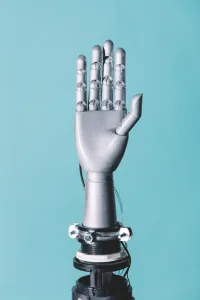If you are interested in the latest developments in artificial intelligence, you may have heard of GPT-4. It is the most advanced AI system yet, capable of creating human-like text from any input, including images and text. But the question on many people’s minds is, is GPT a threat to humanity?
In this article, we will explore the facts and myths surrounding GPT-4, its capabilities, and its implications for society. We will delve into its limitations and the challenges ahead for advancing towards deeper and more comprehensive versions of AGI (Artificial General Intelligence). We will also examine the ethical implications of such a technology and how it could affect the job market and society as a whole.
What is GPT-4?
 GPT-4 stands for Generative Pre-trained Transformer 4. It is an AI system developed by OpenAI, a research organization dedicated to creating and ensuring the safe use of artificial intelligence. GPT-4 is a large multimodal model that has been trained on an unprecedented scale of compute and data from the internet.
GPT-4 stands for Generative Pre-trained Transformer 4. It is an AI system developed by OpenAI, a research organization dedicated to creating and ensuring the safe use of artificial intelligence. GPT-4 is a large multimodal model that has been trained on an unprecedented scale of compute and data from the internet.
Unlike previous AI models, GPT-4 uses a technique called self-attention to learn how different parts of an input relate to each other. It can generate relevant and coherent outputs based on what it has learned, without any specific programming or knowledge.
What can GPT-4 do?
GPT-4 has shown remarkable capabilities across a variety of domains and tasks, challenging our understanding of learning and cognition. It can write creative and technical texts, answer questions on various topics, solve problems that require logic and reasoning, generate captions for images, and more. It can also write texts in multiple languages, with specific constraints, goals, and tones.
While GPT-4 exhibits more general intelligence than previous AI models, it still has limitations. Researchers at Microsoft, who have also been studying GPT-4, have put special emphasis on discovering its limitations and discussing the challenges ahead for advancing towards deeper and more comprehensive versions of AGI.
Is GPT-4 a threat to humanity?
There is no evidence that GPT-4 poses any immediate threat to humanity. In fact, researchers at Microsoft have demonstrated that GPT-4 can solve novel and difficult tasks that span mathematics, coding, vision, medicine, law, psychology, and more without needing any special prompting. However, there are several concerns that should be addressed.
Ethical implications
 As GPT-4 becomes more advanced, it raises ethical questions about its use and impact on society. For instance, if GPT-4 can write articles, stories, and books as well as humans, what will happen to the job market for writers and journalists? Will GPT-4 replace human writers, leading to massive unemployment?
As GPT-4 becomes more advanced, it raises ethical questions about its use and impact on society. For instance, if GPT-4 can write articles, stories, and books as well as humans, what will happen to the job market for writers and journalists? Will GPT-4 replace human writers, leading to massive unemployment?
Moreover, GPT-4 can generate convincing fake texts and images, which could have serious consequences for politics, business, and personal relationships. It could be used to spread misinformation, propaganda, or hate speech on a large scale. Therefore, it is crucial to develop measures to detect and counter such misuse of GPT-4.
Privacy Concerns
Another concern is the privacy of the data used to train GPT-4. The internet is full of sensitive information, personal data, and copyrighted materials that may have been used to train GPT-4 without consent or compensation. It is essential to ensure that the data used to train GPT-4 is ethical, legal, and transparent.
Moreover, GPT-4 can potentially be used to infringe on people’s privacy, by generating realistic fake texts, images, or videos that can be used for blackmail, fraud, or harassment. Therefore, it is crucial to develop safeguards against such abuses of GPT-4.
The Positive Impacts of GPT-4
While there is no concrete evidence to suggest that GPT-4 is a threat to humanity, there are several reasons to believe that it can be a force for good. For instance, GPT-4 has already shown impressive results in various domains, including healthcare, education, and entertainment.
In healthcare, GPT-4 can help doctors and researchers make sense of complex medical data and generate hypotheses for further investigation. For instance, GPT-4 can analyze medical records, images, and research papers to suggest possible treatments for a particular disease or condition. It can also generate reports and summaries of medical studies, making it easier for doctors to keep up with the latest research.
In education, GPT-4 can help students and teachers create and evaluate educational content more efficiently. For instance, GPT-4 can generate multiple-choice questions and answers for exams, saving teachers time and effort. It can also provide feedback on student essays and assignments, helping students improve their writing skills. Moreover, GPT-4 can help with language learning by generating dialogues, stories, and exercises that are tailored to the learner’s level and interests.
In entertainment, GPT-4 can help artists and writers create new works of art and literature. For instance, GPT-4 can generate plots, characters, and dialogues for novels, screenplays, and video games. It can also compose music and lyrics for songs, and create visual art such as paintings and sculptures. Moreover, GPT-4 can enhance the user experience of video games by generating personalized quests, challenges, and environments.
The Negative Impacts of GPT-4
 Despite the potential benefits of GPT-4, there are also concerns about its negative impacts on society. One of the main concerns is that GPT-4 can make human labor obsolete, leading to massive unemployment and income inequality. For instance, GPT-4 can already generate high-quality texts that are indistinguishable from those written by humans, which could threaten jobs in journalism, content creation, and marketing. Moreover, GPT-4 can also automate tasks in other domains such as customer service, data analysis, and legal research, which could lead to further job losses.
Despite the potential benefits of GPT-4, there are also concerns about its negative impacts on society. One of the main concerns is that GPT-4 can make human labor obsolete, leading to massive unemployment and income inequality. For instance, GPT-4 can already generate high-quality texts that are indistinguishable from those written by humans, which could threaten jobs in journalism, content creation, and marketing. Moreover, GPT-4 can also automate tasks in other domains such as customer service, data analysis, and legal research, which could lead to further job losses.
Another concern is that GPT-4 can be used for malicious purposes such as propaganda, misinformation, and cyberattacks. For instance, GPT-4 can generate fake news articles, social media posts, and reviews that are designed to manipulate public opinion. It can also impersonate individuals and organizations, making it harder to distinguish between real and fake information. Moreover, GPT-4 can be used to launch sophisticated cyberattacks such as phishing, social engineering, and data theft, which could cause significant harm to individuals and organizations.
Finally, there are concerns about the ethical and social implications of GPT-4, particularly in terms of bias, privacy, and accountability. For instance, GPT-4 can perpetuate biases and stereotypes that are present in the data it was trained on, leading to unfair and discriminatory outcomes. It can also raise privacy concerns by collecting and analyzing large amounts of personal data without the consent or knowledge of individuals. Moreover, GPT-4 can pose challenges for accountability and transparency, as it is often unclear how it arrived at a particular output and who is responsible for its actions.
Is GPT-4 a Threat to Humanity?
In conclusion, the question of whether GPT-4 is a threat to humanity is complex and multifaceted. While there is no evidence to suggest that GPT-4 poses an immediate existential threat, there are concerns about its potential negative impacts on society. These concerns include the possibility of massive job displacement, the spread of misinformation and propaganda, and the ethical and social implications of AI.
It is clear that GPT-4 has remarkable capabilities that challenge our understanding of learning and cognition. It can solve complex tasks in various domains without requiring any special prompting, and its potential for language generation and manipulation is staggering. However, it is important to recognize that GPT-4 is still limited in its abilities and requires ongoing research and development to achieve deeper and more comprehensive versions of AGI.
The development of AI is a rapidly evolving field, and it is crucial that we continue to monitor and regulate its progress to ensure that it benefits humanity rather than harms it. The debate around AI’s potential to be a threat to humanity is ongoing, and it is up to all of us to be informed and engaged in shaping its development.
As we continue to explore the capabilities of GPT-4 and other AI systems, we must also consider their ethical and social implications. The development of AI has the potential to exacerbate existing social inequalities and create new ones, as well as challenge fundamental human values such as privacy, autonomy, and dignity. It is essential that we take a proactive approach to addressing these issues and ensure that AI is developed in a way that reflects our shared values and priorities.
The Future of AI and Humanity
The development of GPT-4 and other advanced AI systems raises important questions about the future of humanity and our relationship with technology. As AI becomes more integrated into our daily lives, we must ask ourselves how we can ensure that it serves our interests and values rather than becoming a threat to them.
One potential solution is to focus on developing AI systems that are aligned with human values and interests. This approach, known as value alignment, aims to ensure that AI systems are designed and developed in a way that reflects our shared values and priorities. By prioritizing value alignment in the development of AI, we can create systems that are more transparent, accountable, and trustworthy.
Another approach is to focus on developing robust governance and regulation frameworks for AI. These frameworks can help ensure that AI systems are developed and deployed in a responsible and ethical manner, and can address concerns such as bias, transparency, and accountability. By developing effective governance and regulation frameworks, we can ensure that AI serves the interests of humanity rather than posing a threat to it.
Finally, we must recognize that the development of AI is not a purely technical issue, but a social and political one as well. It is up to all of us to engage in the conversation around AI and its potential impacts on society, and to advocate for policies and practices that prioritize the interests of humanity.
Conclusion
In conclusion, the development of GPT-4 and other advanced AI systems represents a significant milestone in the field of artificial intelligence. While there are concerns about the potential negative impacts of AI on society, there is no evidence to suggest that GPT-4 poses an immediate existential threat. However, it is crucial that we continue to monitor and regulate the development of AI to ensure that it benefits humanity rather than posing a threat to it.
As we continue to explore the capabilities of AI, we must also consider its ethical and social implications. By prioritizing value alignment, developing effective governance and regulation frameworks, and engaging in the conversation around AI, we can ensure that it serves the interests of humanity and contributes to a better future for all.
